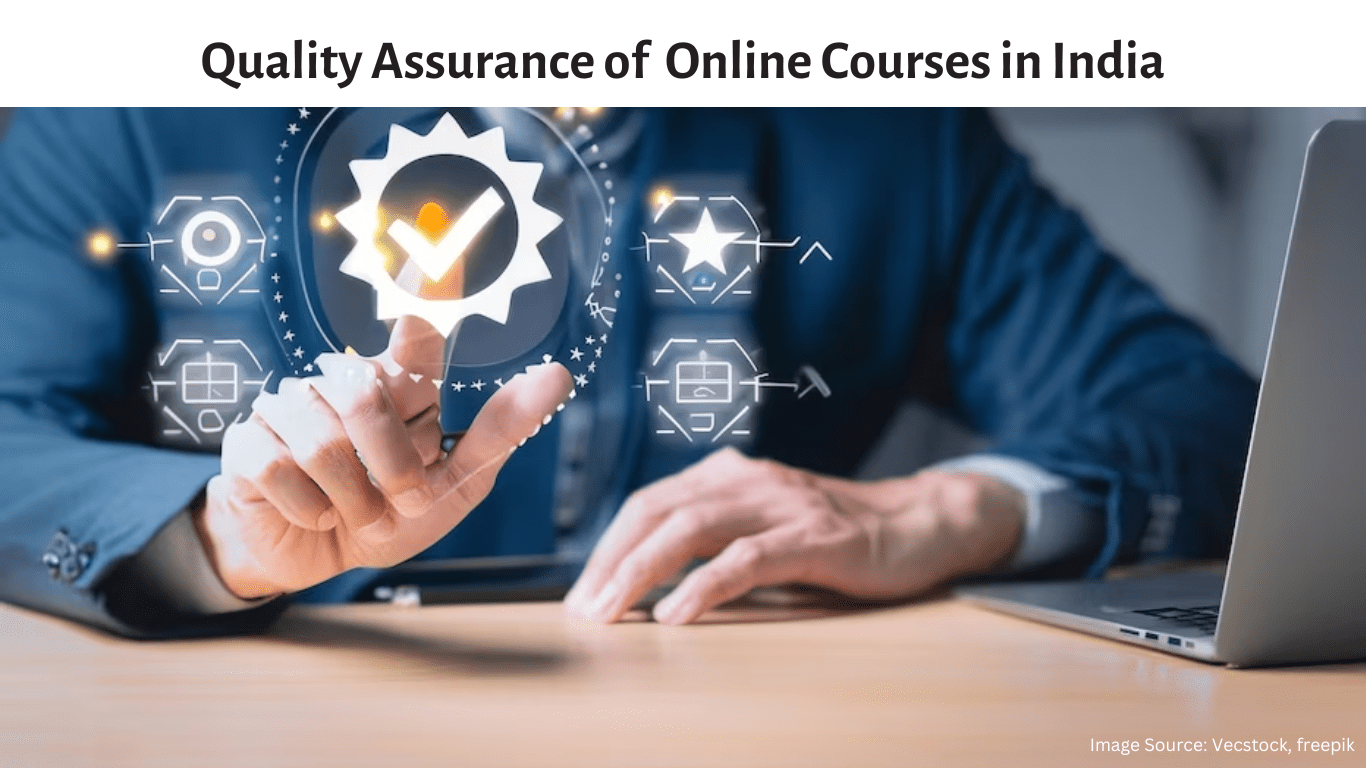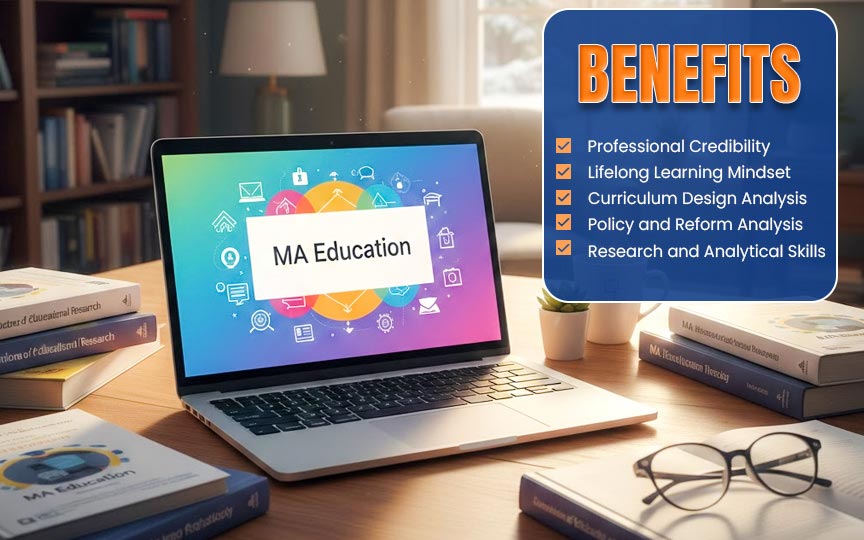Quality assurance in online education refers to the methods and processes put in place to evaluate and ensure that the program meets the required standards, best practices, and learning outcomes. The importance of quality assurance in online education cannot be overstated. It ensures that the students receive a reputable and accredited education that meets the global standard for their industry. In addition, it ensures that the students receive accurate information, appropriate feedback, and effective communication with faculty members. However, ensuring the quality of online education in India is not without its challenges.
To guarantee that students have a worthwhile and productive learning experience, monitoring of quality is essential in online education. Like many other nations, India relies on several important elements to ensure the quality of its online education.
In this blog, we will discuss the current scenario of online education in India, the challenges faced in ensuring quality assurance, initiatives taken by regulatory bodies, and the future of online education.
Current Scenario of Online Education in India
The rise of technology and the pandemic has led to the growth of online education in India. However, the quality of education remains a significant issue for this sector.
The growth of online education in India has been significant. The pandemic has further accelerated the adoption of this mode of education. According to Statista, the e-learning market in India is expected to reach $2 billion by 2021.
However, there are several issues with quality assurance in online education. The lack of interactivity, inadequate assessment, and the absence of face-to-face interaction are some of the challenges faced by students. Teachers also face challenges in delivering quality education online.
The growth of online education is a clear indication of the education sector’s potential to adopt new technology. However, the sector needs to focus on ensuring quality assurance in online education. With proper infrastructure, teacher training, and assessment tools, the online education sector can provide quality education to students.
Challenges Faced in Ensuring Quality Assurance in Online Education
Online education has become a vital part of the Indian education system in recent times. It provides accessibility and flexibility to a large population who cannot attend traditional classroom programs due to geographical or financial constraints. However, with the increasing demand for online education, the need for quality assurance has become crucial. Current Scenario of Online Education in India: The online education market in India is projected to surpass USD 2 billion by 2021. However, the industry, like any other growing sector, has its flaws and limitations.
-
Accreditation and Recognition
Verify if recognized accredited organizations have authorized online learning organizations and programs. An institution’s accreditation guarantees that it offers excellent education and ensures certain academic requirements. It provides more if the institution and courses have government recognition and approval of online programs and courses.
Given below is the list and details of all the important regulatory bodies which play a significant role in the sector of education.
-
The University Grants Commission (UGC)
The University Grants Commission (UGC) is India’s main higher education regulating organization. It guarantees the preservation of educational quality and establishes guidelines for universities. UGC certifies organizations that offer online programs and offers rules for online learning.
-
The All India Council for Technical Education (AICTE)
The All India Council for Technical Education (AICTE) is in charge of accrediting and overseeing technical education establishments in India. It is essential to preserve the standard of technical and engineering education programs offered online.
-
The National Board of Accreditation (NBA)
The National Board of Accreditation (NBA) is an independent entity within the AICTE that evaluates and grants accreditation to technical programs. It plays a crucial role in upholding the highest standards of quality for engineering and technology education, including virtual courses.
-
Bureau of Distance Education (DEB):
Under the UGC, DEB is responsible for promoting and coordinating programs for remote learning. It creates rules and regulations for online education as well as open and distance learning.
-
The NIRF, or National Institutional Ranking Framework,
Under the Ministry of Education, NIRF assigns rankings to educational institutions according to several criteria. The overall caliber of the universities, including those that offer online education, is indicated by the rankings.
-
Quality Council of India (QCI):
An independent organization called QCI is dedicated to ensuring high standards in several sectors, including education. It could take part in programs and institutions’ accreditation to guarantee quality control.
-
Indian Universities Association (AIU):
An organization called AIU serves as an association for India’s largest universities. It helps to organize and promote university events, which include upholding high standards for instruction.
-
NTA, the National Testing Agency:
The NTA is in charge of holding entrance tests for different courses. Its main function is to administer tests, but it also indirectly supports quality control by guaranteeing impartial and uniform exams for online program admissions.
-
Departments of Education at the State Level:
Online education institutions are subject to governmental regulations and accreditation, which are largely overseen by education departments at the state level. They might have their policies and procedures in place to guarantee excellence.
Before taking admission to any online college, institute, or university, ensure that the organization is associated with any of the following regulatory bodies to be sure about the investment you are going to make.
Initiatives Taken to Ensure Quality Assurance in Online Education in India
Initiatives Taken to Ensure Quality Assurance in Online Education in India: As the demand for online education increases, the need for quality assurance becomes more essential. There are several initiatives taken by the regulatory bodies in India to ensure quality in online education.
The Indian government has taken several steps to ensure quality assurance in online education.
The University Grants Commission (UGC) has laid down regulations for online learning platforms to follow. These regulations include guidelines for creating and delivering quality content, conducting exams, and issuing certificates. The UGC also requires online learning platforms to provide student support such as guidance and counselling.
The All India Council for Technical Education (AICTE) has also laid down guidelines for online learning. The guidelines include the requirement for proper infrastructure, trained faculty, and quality content. AICTE insists on maintaining industry standards in the curriculum, teaching methods, and assessments.
The Quality Council of India (QCI) plays a significant role in quality assurance in online education. QCI has collaborated with online learning platforms to create quality frameworks that determine the effectiveness of online education in terms of learning outcomes. The QCI assesses online learning platforms and their courses based on these frameworks.
Overall, these initiatives by regulatory bodies in India are aimed at ensuring quality in online education. However, the success of these initiatives depends on the participation of online learning platforms and strict enforcement of regulations by the regulatory authorities. So, if you’re considering online education as an option, don’t forget to check if the online learning platform you choose follows these guidelines to ensure that you get the best quality education possible.
Future of Online Education with Quality Assurance in India
The demand for online education is skyrocketing in India due to its flexibility and accessibility. Quality assurance has become a primary concern, and online education providers are taking ample measures to ensure the same. With technology advancing at a rapid pace, scalability and accessibility of online education have become crucial. The ability to cater to a wider audience with the same quality of education has become a necessity. Online teaching is a new domain that has vast scope for career opportunities.
With the increasing demand for online education, the demand for online teachers has also increased. Online teaching is not only a flexible option but is also financially rewarding. Educators can now reach out to thousands of students cutting across physical boundaries. The ability to reach out to more students has helped teachers to hone their skills and earn more.
In conclusion, online education has tremendous potential in India. However, ensuring quality assurance is of utmost importance to thrive in this domain. The government has taken steps to ensure that online education systems are subject to the same standards of quality as traditional courses.
With the current demand trends and the right approach, online education can soon become mainstream education with quality assurance.
Conclusion
In conclusion, accreditation, curriculum design, certified teachers, methods of assessment, technology infrastructure, student support services, feedback methods, data security, industry collaboration, ongoing improvement, transparency, and regulatory compliance should all be included in a thorough quality assurance framework for online education in India. Students are guaranteed a comprehensive and successful online learning experience with this integrated approach.
With the right initiatives and continuous efforts, the potential of online education can be fully realized. It is up to all stakeholders to come together and work towards a better future for online education in India. Let’s hope we can overcome these challenges and realize the true potential of online education.







